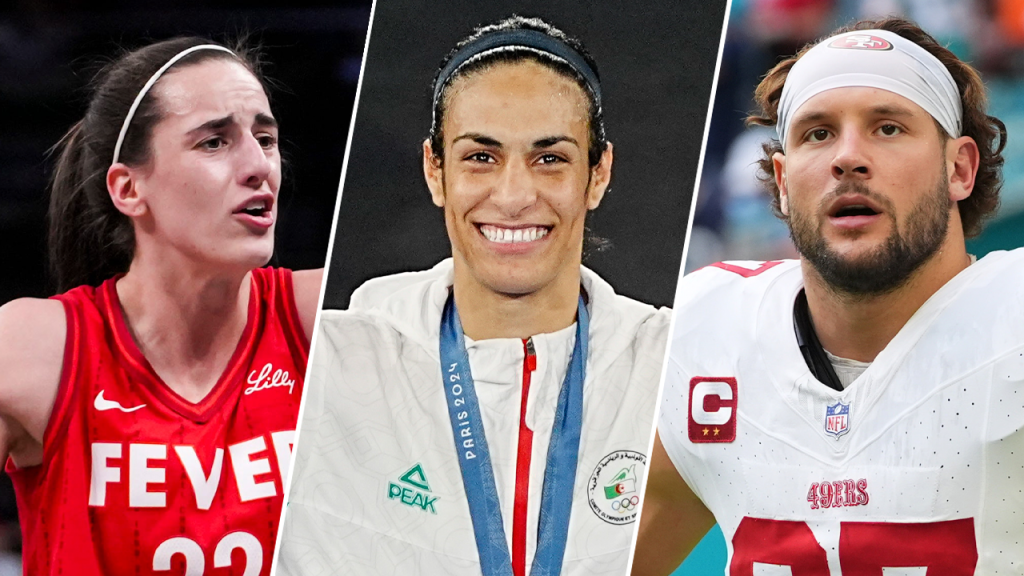I. The Gender Eligibility Debate at the Paris Olympics:
The 2024 Paris Olympics witnessed a significant controversy surrounding the eligibility of transgender athletes in women’s sports. Imane Khelif, an Algerian boxer, became the most Googled athlete of the year after winning gold in her weight class despite previous disqualification from the 2023 World Championships due to questions about her gender. The International Boxing Association (IBA) president had cited Khelif’s "XY chromosomes," typically associated with biological males, as the reason for disqualification. However, the International Olympic Committee (IOC) defended Khelif and another transgender athlete, Lin Yu-ting of Taiwan, who also won gold, stating that they were victims of an arbitrary decision by the IBA. Khelif’s dominance in Paris, even prompting forfeits from opponents, further fueled the debate over fairness and inclusion in women’s sports. This controversy ignited a broader discussion about the IOC’s policies on transgender athletes and the criteria for inclusion in gender-specific categories, raising questions of competitive balance and the rights of both cisgender and transgender athletes. The incident highlighted the complex and sensitive nature of navigating gender identity and its intersection with sports, leaving a lasting impact on the Olympic Games and the sporting world as a whole.
II. Physicality and Race in the WNBA:
Caitlin Clark’s historic rookie season in the WNBA was marred by several on-court incidents involving physical play. While Clark’s exceptional talent garnered widespread attention, so did the aggressive fouls she endured from opponents. A particularly controversial moment involved Chicago Sky’s Chennedy Carter checking Clark to the floor, sparking debate about whether opponents were targeting her unfairly. The incident fueled discussions about player safety, the acceptable level of physicality in women’s basketball, and the potential racial undertones within these discussions. Another incident involving physical contact with fellow rookie Angel Reese, although acknowledged as unintentional by both players, further highlighted the scrutiny surrounding Clark’s physical treatment on the court. The controversies surrounding these incidents emphasized the challenges faced by rising stars in professional sports and the intersection of race, gender, and athleticism in the public discourse.
III. Transgender Athletes in Collegiate Volleyball:
San Jose State University’s women’s volleyball team faced significant controversy due to the inclusion of transgender athlete Brooke Fleming. Multiple opponents forfeited matches against SJSU, seemingly in protest against Fleming’s participation, sparking national headlines and renewed debate surrounding transgender athletes in women’s sports. The situation escalated further with internal team controversies, including lawsuits filed by team captain Brooke Slusser alleging a lack of transparency from the university and Fleming regarding Fleming’s gender identity. Slusser also challenged the NCAA’s policies on transgender athletes. Despite the forfeits and internal dissent, SJSU advanced to the Mountain West Conference championship match, highlighting the complexities and polarizing views surrounding the inclusion of transgender athletes in collegiate sports. The case further illuminated the legal and ethical challenges faced by athletic organizations as they grapple with balancing inclusivity and fairness in competition.
IV. Contested Medals and Racial Allegations in Gymnastics:
Jordan Chiles’ bronze medal in the floor exercise at the Paris Olympics became a subject of controversy following a scoring dispute. After an initial appeal by American coaches led to a score adjustment and the bronze medal being awarded to Chiles, the Court of Arbitration for Sport overturned the decision, citing a missed deadline for the appeal. The medal was subsequently returned to Romanian gymnast Ana Barbosu, originally placed fourth. The incident sparked emotional responses, with Chiles alleging racially motivated attacks on social media and fellow Olympian Simone Biles joining efforts to reinstate Chiles’ medal. This case highlighted the challenges of judging subjective sports and the potential for controversy in Olympic scoring decisions, further complicated by accusations of racial bias. The situation became a focal point in broader conversations about fairness, representation, and the impact of social media on athletes.
V. Political Expressions and Celebratory Dances in the NFL:
The 2024 NFL season saw its share of political controversies. San Francisco 49ers defensive end Nick Bosa’s decision to wear a "Make America Great Again" hat during a post-game interview, a clear violation of the NFL’s ban on political messaging, resulted in a fine. Bosa, however, defended his action, deeming it “worth it” following Donald Trump’s election victory. Separately, several NFL players celebrating touchdowns with a dance mimicking Trump’s campaign rally moves sparked social media frenzy and further blurred the lines between sports and politics. While the NFL didn’t penalize the dance, both incidents highlighted the increasing politicization of professional sports and the diverse reactions it elicits from fans and the broader public. These events underscore the tension between athletes’ freedom of expression and league regulations designed to maintain neutrality.
VI. Unexpected Draft Picks and Coaching Changes in the NFL:
The Atlanta Falcons’ decision to draft quarterback Michael Penix Jr. in the first round of the NFL Draft, despite having recently signed veteran quarterback Kirk Cousins to a lucrative contract, caused widespread confusion and controversy. The move prompted questions about the Falcons’ strategy and raised speculation about Cousins’ future with the team. Penix eventually became the starting quarterback, further highlighting the surprising nature of the draft pick and the resulting impact on the team’s dynamics. In another unexpected turn of events, legendary coach Bill Belichick’s failure to secure a new NFL coaching position after parting ways with the New England Patriots generated significant buzz. Despite his impressive track record, Belichick ultimately accepted a college coaching position at the University of North Carolina, marking a surprising shift in his career trajectory. The unexpected draft pick and Belichick’s move to college football underscored the unpredictable nature of the NFL coaching carousel and the evolving landscape of the sport. Additionally, the inclusion of Rachel “Raygun” Gunn, an Australian breakdancer who garnered attention for her unconventional style and low score at the Paris Olympics, added another layer of intrigue to the sporting year. Gunn’s participation, while not necessarily controversial, sparked discussion about judging criteria in artistic sports and the varied perspectives on performance and competition.

